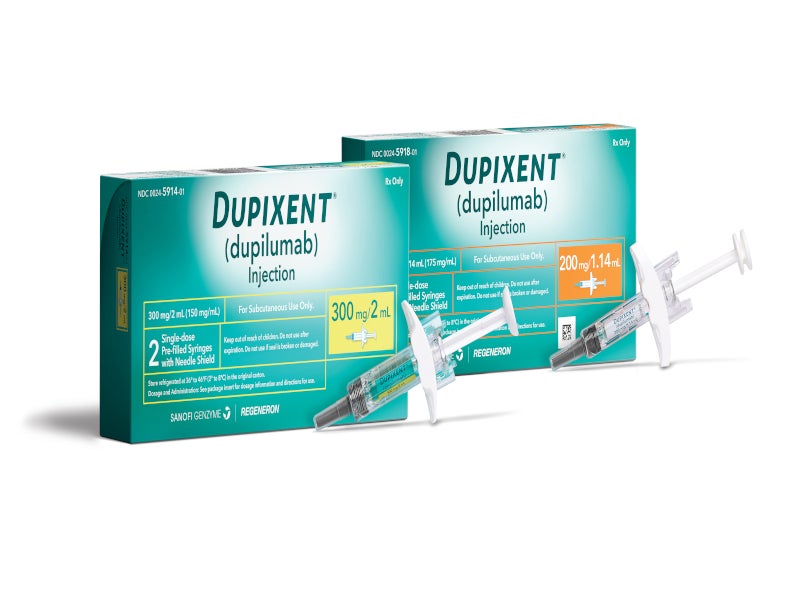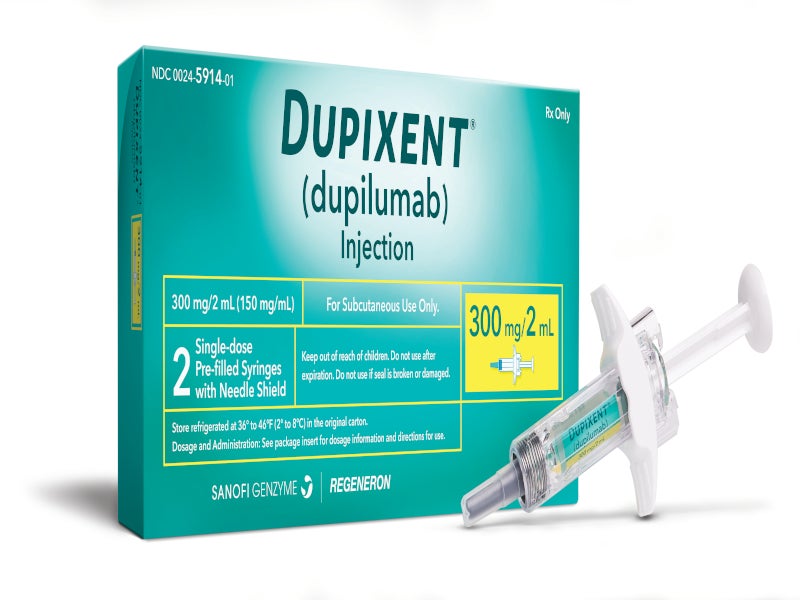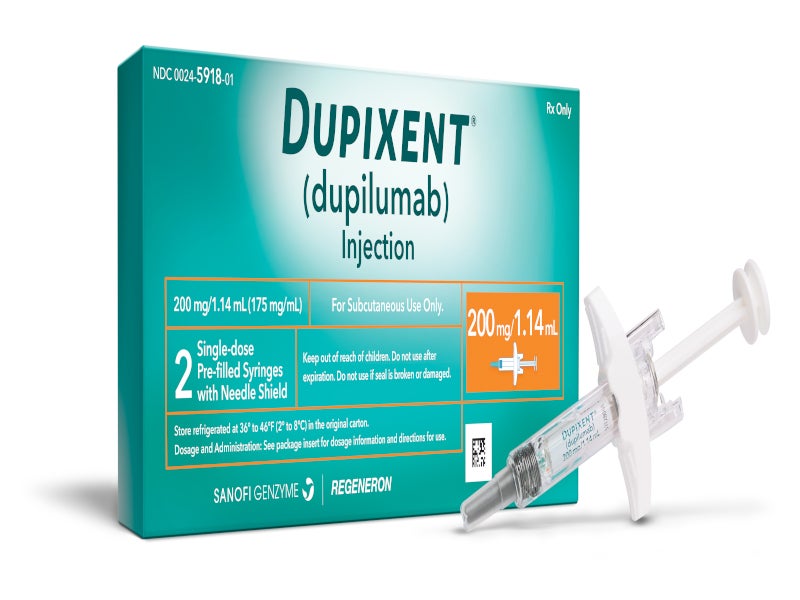Dupixent (dupilumab) is a monoclonal antibody for the treatment of atopic dermatitis (eczema), asthma, chronic rhinosinusitis with nasal polyposis and eosinophilic esophagitis.
Developed jointly by Sanofi and Regeneron, Dupixent is available in the form of a pre-filled pen (for patients who are two years or above) or a pre-filled syringe (for patients who are six months or more) for subcutaneous injection in 200mg and 300mg doses. A 100mg drug dosage in a single-dose pre-filled syringe is also available.
Regulatory approvals for Dupixent
The US Food and Drug Administration (FDA) granted breakthrough therapy designation to Dupixent for uncontrolled atopic dermatitis in 2014.
The FDA accepted a biologics license application (BLA) for the drug in September 2016 and approved it for the treatment of patients with moderate-to-severe atopic dermatitis in March 2017.
Dupixent also received a marketing authorisation for the drug in the European Union (EU) to treat atopic dermatitis in adult patients in September 2017, as well as approval in Canada and Japan.
In October 2018, the FDA approved the drug as an add-on maintenance therapy to treat moderate-to-severe asthma in patients aged 12 years and over with oeosinophilic phenotype or oral corticosteroid-dependent asthma.
In November 2018, the FDA accepted a supplemental BLA for the drug under priority review status to treat adolescent patients aged between 12 and 17 years with moderate-to-severe atopic dermatitis. Approval was granted in March 2019.
In June 2019, the drug became the first treatment to be approved by the FDA for the treatment of nasal polyps accompanied by chronic rhinosinusitis in adult patients. Nasal polyps are growths on the inner lining of the sinuses, which are accompanied by prolonged inflammation of the sinuses and nasal cavity.
In May 2020, the FDA approved the drug for the treatment of atopic dermatitis in children aged six to 11 years, making it the first biologic medicine for that patient population. Dupixent was subsequently approved for the same patient population in Europe in November 2020.
In March 2021, the FDA accepted a supplemental BLA for the drug as an add-on treatment for uncontrolled moderate to severe asthma in children aged six to 11 years and granted approval in October 2021.
The FDA approved Dupixent to treat eosinophilic esophagitis in adults and paediatric patients aged 12 years and older and weighing at least 40kg in May 2022.
In June 2022, the FDA granted approval to Dupixentas the first biologic medicine for the treatment of children aged from sixto five years who have moderate-to-severe atopic dermatitis that cannot be controlled with topical prescription therapies.
The drug was also approved in Europe for the condition in March 2023.
It is the first and only targeted medicine for children as young as six months old with severe atopic dermatitis.
Atopic dermatitis condition and symptoms
Atopic dermatitis is a long-term chronic form of eczema commonly seen in people with sensitive skin and a malfunctioning immune system. The disease results from an allergic response generated by a subset of immune cells known as Type 2 helper T cells (Th2).
The infection is characterised by inflammation of the skin, together with itchy, red, swollen cracks, oozing and crusting blisters, dry skin, ear discharge or bleeding, change in skin colour and thickened or leather-like patches on the skin formed due to irritation and scratching.
The disease is most commonly seen in infants younger than two years with itchy and scaly rashes on the face, scalp, hands and feet. In adults, atopic dermatitis rashes often develop inside the knees, elbows, neck, hands and feet.
An estimated seven to eight million adults in the US are affected with a moderate-to-severe form of atopic dermatitis.
Dupixent’s mechanism of action
Developed utilising Regeneron’s proprietary VelocImmune technology, Dupixent is a fully human monoclonal antibody (mAb) that targets the interleukin-4 (IL-4) receptor alpha subunit (IL-4Rα) and blocks the intercellular signalling of IL-4 and IL-13. These cytokines help maintain the immune response of Th2 cells.
IL-4 and IL-13 drive away the type 2 inflammation that plays a crucial role in atopic dermatitis, asthma, chronic rhinosinusitis with nasal polyposis (CRSwNP) and oeosinophilic oesophagitis.
The drug blocks IL-4 and IL-13 signalling and successfully mitigates the symptoms of atopic dermatitis and asthma.
Clinical trials on Dupixent
The FDA’s initial approval of the drug for moderate to severe atopic dermatitis in adults was based on results from the global Liberty AD clinical programme, which included about 3,000 patients in Phase III trials SOLO I, SOLO II and CHRONOS.
CHRONOS was a Phase III, randomised, double-blind, placebo-controlled, multi-national trial to evaluate the drug’s efficacy and safety. It enrolled 740 adult patients with moderate-to-severe atopic dermatitis who had initially been treated with medium-potency topical corticosteroids (TCS) or low-potency topical corticosteroids (TCS).
The subjects in the trial were divided into three treatment teams, which received either dupilumab 300mg once a week, dupilumab 300mg every two weeks, or placebo. The study met its primary and secondary endpoints and showed that dupilumab with TCS improved the overall disease severity at weeks 16 and 52 compared with placebo.
SOLO I and SOLO II were two identical Phase III trials conducted on 1,379 patients with moderate-to-severe atopic dermatitis to examine their efficacy and safety.
The subjects were divided into three treatment teams, receiving either dupilumab 300mg once a week, dupilumab 300mg every two weeks, or placebo for 16 weeks after an initial dupilumab dose of either 600mg or placebo.
The subjects in the trial were assessed on a five-point Investigator’s Global Assessment (IGA) scale and Eczema Area and Severity Index (EASI).
In both trials, the subjects who received dupilumab 300mg once a week and 300mg every two weeks achieved clearing or near clearing of skin lesions, as well as EASI-75 at week 16 compared to those who received placebo.
The trials also demonstrated that treatment with dupilumab reduced disease severity and itching while also improving the quality of life and mental health of patients.
The FDA’s approval of Dupixent as an add-on maintenance therapy for moderate and severe asthma patients was based on results from pivotal randomised, placebo-controlled, multi-centre clinical trials named Trial I, Trial II and Trial III.
The pivotal trials evaluated the drug’s safety and efficacy in 2,888 adult and adolescent patients suffering from moderate-to-severe asthma.
The drug reduced the exacerbations and improved lung function in the patients in Trial I. Severe exacerbations were reduced by 67% compared to placebo and lung functions by 29% to 33% compared with 14% to 16% in patients who received placebo.
In Trial III, Dupixent reduced the average daily oral corticosteroid use by 70%, compared to 42% in patients treated with placebo. More than 50% of the patients treated with Dupixent completely eliminated the use of oral corticosteroids.





